How Technology is Transforming the Heart of the Home
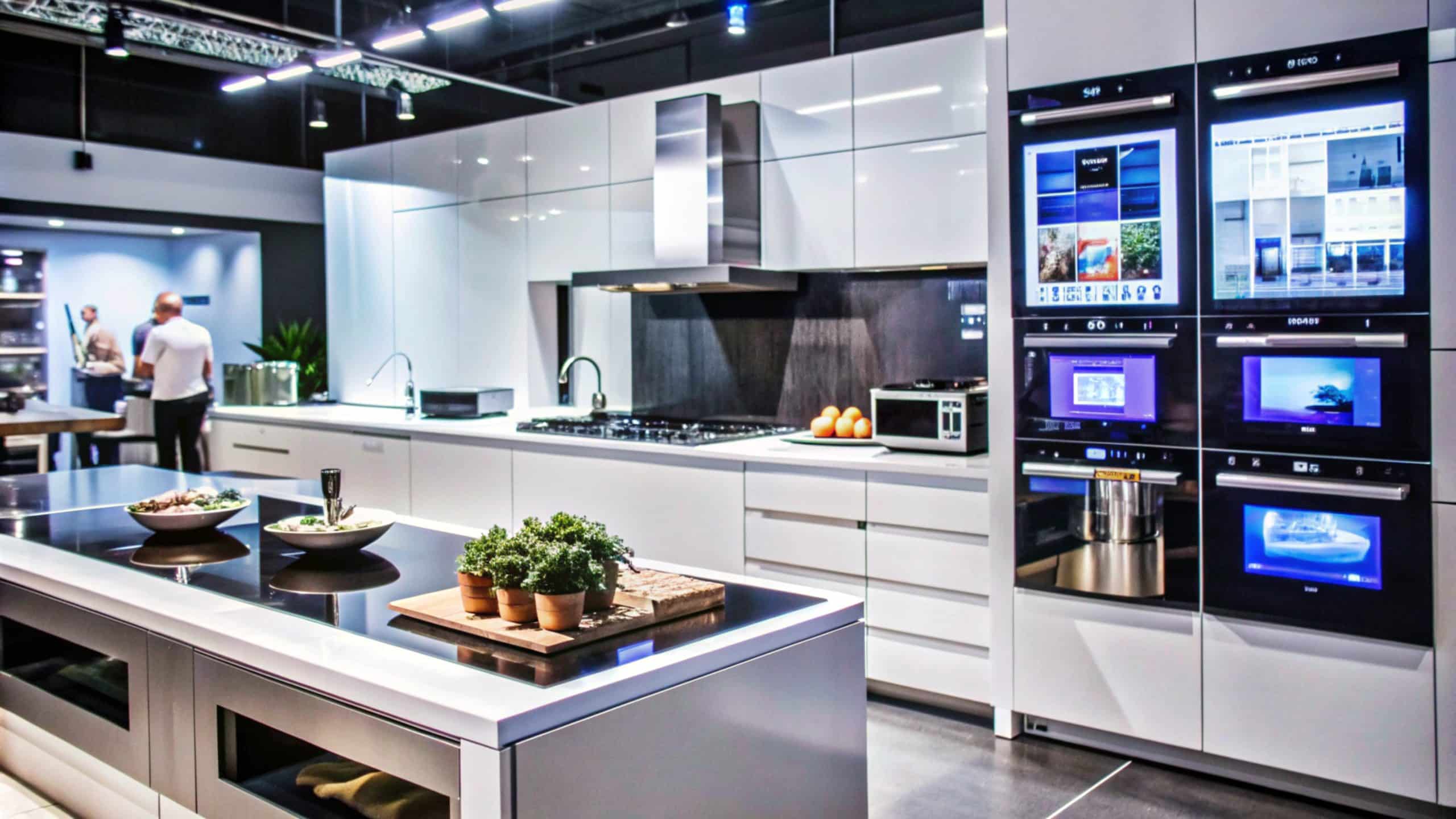
Smart Kitchen
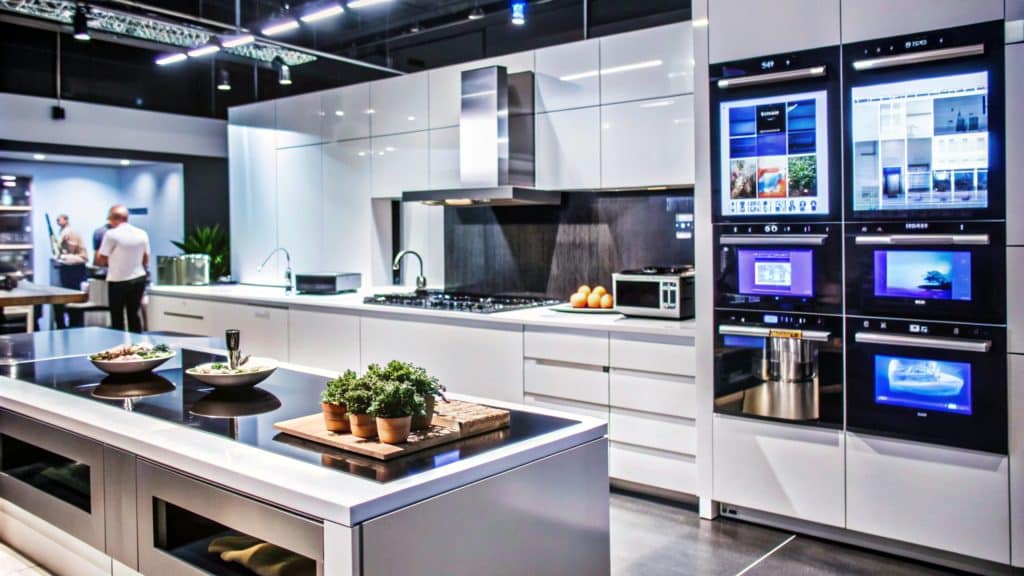
The kitchen has always been considered the heart of the home. It is where we prepare meals, gather with family, and share good moments.
But with the rise of technology, this space has gained a new version: the smart kitchen.
It combines connectivity, automation, and modern design to make daily routines more practical, safer, and even sustainable.
What is a Smart Kitchen?
A smart kitchen is an environment designed to make household tasks easier through technology. It goes beyond modern appliances:
it is an ecosystem where devices connect with each other and can be controlled through smartphones, apps, or voice assistants such as Alexa and Google Assistant.
The goal is simple: save time, reduce waste, and bring more comfort to everyday life.
Main Smart Kitchen Appliances
Smart Refrigerators
Smart refrigerators are one of the most impressive examples of how technology is reshaping the kitchen. These devices go far beyond cooling food.
With built-in cameras, sensors, and connectivity, they can monitor stored food in real time, allowing you to check what’s inside directly from your smartphone.
They also notify you about products close to expiration, helping to reduce waste and save money. Many models use advanced technology to suggest recipes based on available ingredients, making meal planning easier and healthier.
Some high-end versions even integrate with online grocery services, so the fridge can automatically place orders when it detects that essential items are running low.
This combination of smart features shows how technology in appliances is not just about convenience, but also about promoting sustainability, efficiency, and better organization in daily life.
Connected Stoves and Ovens
Connected stoves and ovens are a perfect example of how technology is making everyday cooking smarter and safer.
These appliances can be preheated remotely via app, which means you can start warming up your oven while still on the way home, saving precious time during busy days.
Another highlight is their ability to automatically adjust time and temperature according to the recipe.
Thanks to built-in sensors and advanced cooking programs, these devices use technology to ensure your food is cooked evenly and to perfection, whether it’s baking, roasting, or grilling.
Safety is also a top priority. Many smart ovens and stoves now include safety sensors that shut off in case of risk, such as overheating, gas leaks, or when the appliance has been left on accidentally. This integration of technology and automation not only improves convenience but also provides peace of mind, reducing the chances of accidents in the kitchen.
In short, connected stoves and ovens combine efficiency, precision, and safety—transforming cooking into a stress-free and enjoyable experience.
Smart Dishwashers
Smart dishwashers show how technology can turn a simple household chore into an eco-friendly and highly efficient process.
Unlike traditional models, these appliances are equipped with intelligent sensors that analyze the amount of dishes and the level of dirt before starting the wash.
This allows them to adapt washing cycles according to load size, ensuring that water and detergent are used in the right proportions.
By relying on advanced technology, smart dishwashers can also save water and energy automatically, making them a sustainable choice for modern homes.
Some models connect to mobile apps, where you can schedule cycles, monitor performance, and even receive alerts when maintenance is needed.
Beyond convenience, these machines provide peace of mind, as they optimize resources without compromising cleaning quality. In the long run, investing in a smart dishwasher means combining technology, sustainability, and cost savings—all while keeping your kitchen spotless.
Smart Coffee Makers and Small Appliances

Smart coffee makers and small appliances are among the most popular examples of how technology has entered everyday routines. A smart coffee maker, for instance, does much more than brew your morning cup.
It can be programmed to schedule coffee via smartphone or voice command, so your drink is ready exactly when you want it—whether it’s before you wake up or as you return home from work.
But the innovation doesn’t stop there. Other small kitchen devices, such as air fryers, electric cookers, and toasters, now include remote control features that allow you to start, pause, or monitor cooking from anywhere. This use of technology makes meal preparation faster, more flexible, and less stressful.
Many of these appliances also come with integrated apps that provide step-by-step recipes, adjust cooking settings automatically, and even send notifications when the food is ready.
By combining technology, convenience, and precision, smart small appliances bring a new level of personalization and efficiency to the kitchen.
In short, these devices prove that even the simplest daily tasks—like making coffee or toasting bread—can be transformed into smarter experiences through innovative technology.
Sensors and Automation
Sensors and automation are at the core of how technology enhances safety and efficiency in the modern kitchen.
These intelligent systems are designed to detect gas leaks, smoke, or sudden temperature rise, acting as the first line of defense against potential hazards.
Unlike traditional alarms, smart sensors are directly connected to your home network, allowing instant alerts to be sent to your smartphone, even if you are away.
In addition to monitoring, these systems can trigger alarms or shut down appliances automatically when a threat is detected.
For example, if the oven overheats or a stovetop is left on, automation powered by advanced technology ensures immediate action, preventing accidents before they escalate.
The benefits go beyond safety. Automation can also optimize daily routines by adjusting lighting, regulating ventilation, or coordinating with other connected devices.
This creates a kitchen environment that is not only smarter but also more comfortable and energy-efficient.
By integrating technology into sensors and automated systems, smart kitchens provide greater safety for the entire family while promoting sustainability and peace of mind.
Benefits of a Smart Kitchen
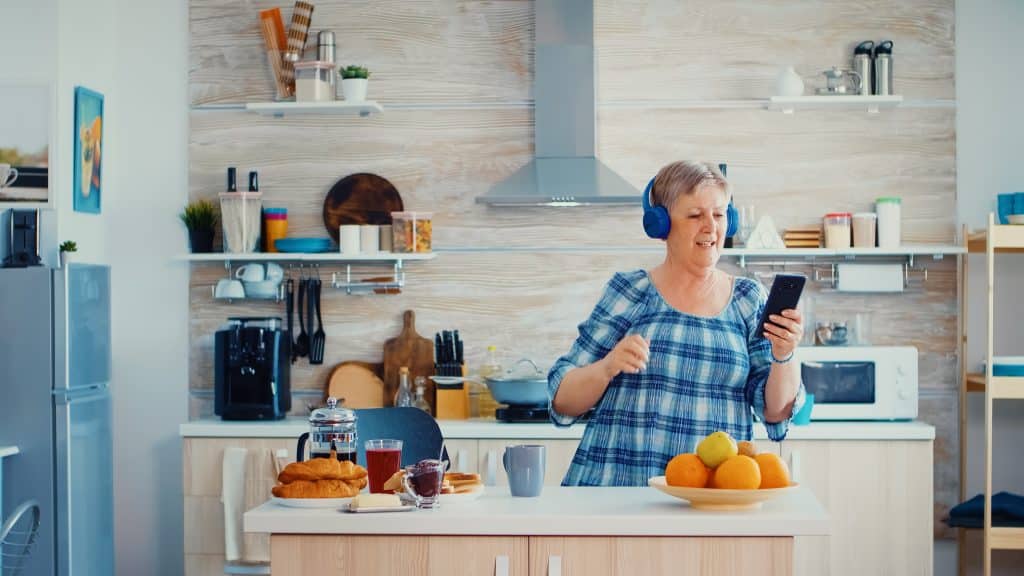
Practicality
One of the biggest advantages of a smart kitchen is practicality. By integrating advanced technology, repetitive tasks that usually take up valuable time can now be automated.
From preheating your oven remotely to scheduling your morning coffee, these features free up time for what really matters—spending moments with family or focusing on personal priorities.
Safety
Safety is a top priority in every home, and smart kitchens excel in this area.
Equipped with sensors and automatic shut-off systems, appliances can instantly detect risks such as overheating, gas leaks, or smoke.
This proactive use of technology prevents accidents and provides peace of mind, whether you are at home or away.
Sustainability
Sustainability is no longer just a trend; it’s a necessity. Smart appliances are designed to reduce water, energy, and food waste by adapting their performance to your real needs.
For example, dishwashers adjust wash cycles to load size, and refrigerators monitor expiration dates to minimize spoiled food.
This eco-friendly use of technology not only protects the planet but also lowers household costs.
Organization
A smart kitchen also means better technology with automatic shopping lists, meal suggestions, and recipe integration, you no longer need to worry about forgetting ingredients or planning meals at the last minute.
These functions, powered by technology, transform your kitchen into a highly efficient space where everything is simplified.
Comfort and PersonalizationOne of the most appealing aspects of a smart kitchen is the focus on comfort and personalization.
Unlike traditional kitchens, these spaces adapt to your needs and preferences, turning everyday cooking into a more enjoyable experience powered by technology.
For example, adjustable lighting can instantly transform the mood.
Bright, cool lights are perfect for focused cooking, while warm, dimmed tones create a cozy atmosphere for family dinners.
This flexibility adds a layer of comfort that matches every occasion.Music integration is another way smart kitchens enhance the environment.
By connecting your appliances to speakers or virtual assistants, you can listen to playlists, podcasts, or even follow cooking instructions hands-free while preparing meals.Interactive screens and mobile apps also play a key role.
They provide step-by-step recipes, real-time cooking guidance, and even video tutorials to ensure every dish is prepared to perfection. This use of technology helps beginners feel confident and allows experienced cooks to explore new techniques.
Ultimately, the blend of technology and design makes smart kitchens unique. They are not just functional spaces but personalized environments where comfort, efficiency, and creativity come together seamlessly.Future Trends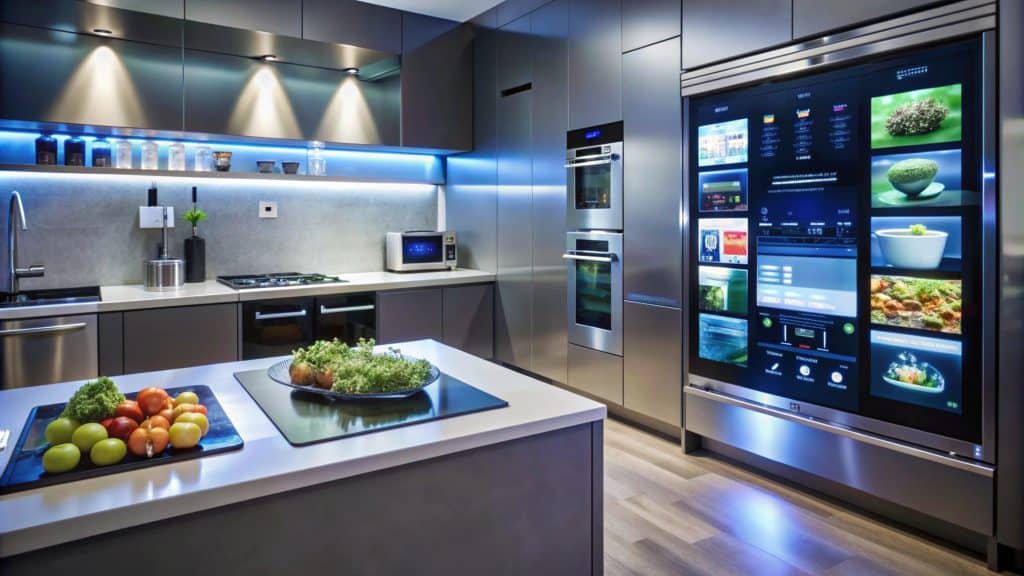 The evolution of smart kitchens is still in its early stages. What we see today is just the beginning of how technology will change the way we cook, organize, and interact with our homes.Upcoming innovations promise to go far beyond convenience.
The evolution of smart kitchens is still in its early stages. What we see today is just the beginning of how technology will change the way we cook, organize, and interact with our homes.Upcoming innovations promise to go far beyond convenience.
They will create kitchens that are smarter, safer, and healthier, while also helping families live in a more sustainable way.With each advancement, technology is moving closer to anticipating our needs instead of simply responding to them.
From appliances that communicate with each other to systems that reduce energy waste, the kitchen is becoming a hub of innovation.In the future, smart kitchens will no longer be seen as a luxury but as a standard feature of modern homes. Their role will be to combine practicality with responsibility, blending efficiency, comfort, and sustainability into everyday life.
AI Integration Artificial Intelligence (AI) is set to play a major role in the kitchens of the future. More than just a buzzword, AI represents the next level of how technology can make daily cooking smarter, healthier, and more efficient.Through advanced data analysis, smart appliances will be able to create personalized menus tailored to individual needs.
This means your kitchen won’t just store food—it will actively help you make better choices.Imagine your refrigerator tracking ingredients and suggesting balanced meal plans based on dietary restrictions, health goals, or even your personal taste preferences.
No more guessing what to cook; your fridge becomes your digital nutritionist.At the same time, ovens and stoves powered by AI will automatically choose the best cooking method for each dish.
From adjusting temperatures to setting timers, these appliances will use technology to guarantee precision and consistency, even for beginners.
In short, AI integration brings the promise of a kitchen that doesn’t just respond to commands but also anticipates your needs.
This seamless blend of technology and healthy living will make cooking easier, smarter, and more enjoyable than ever before.
Augmented RealityAnother exciting trend shaping the future of smart kitchens is the use of augmented reality (AR). This innovation takes cooking beyond traditional methods, offering a more immersive and interactive experience powered by technology.
Instead of flipping through recipe books or constantly checking mobile screens, instructions will be projected directly onto the countertop. I
magine seeing step-by-step visuals right where you’re preparing your food—clear, hands-free, and perfectly timed.
Smart glasses will also play a role in this transformation. With AR-enabled wearables, home cooks will be able to follow recipes, measure ingredients, or even watch guided cooking tutorials without ever looking away from their workspace.
This use of technology makes cooking far more intuitive and accessible, especially for beginners who often struggle with multitasking in the kitchen.
Real-time guidance eliminates mistakes, speeds up preparation, and boosts confidence in trying new dishes.
Ultimately, augmented reality will turn cooking into a more engaging and enjoyable activity—where the kitchen becomes not just a place to prepare meals but a space where technology and creativity meet.Collaborative Appliances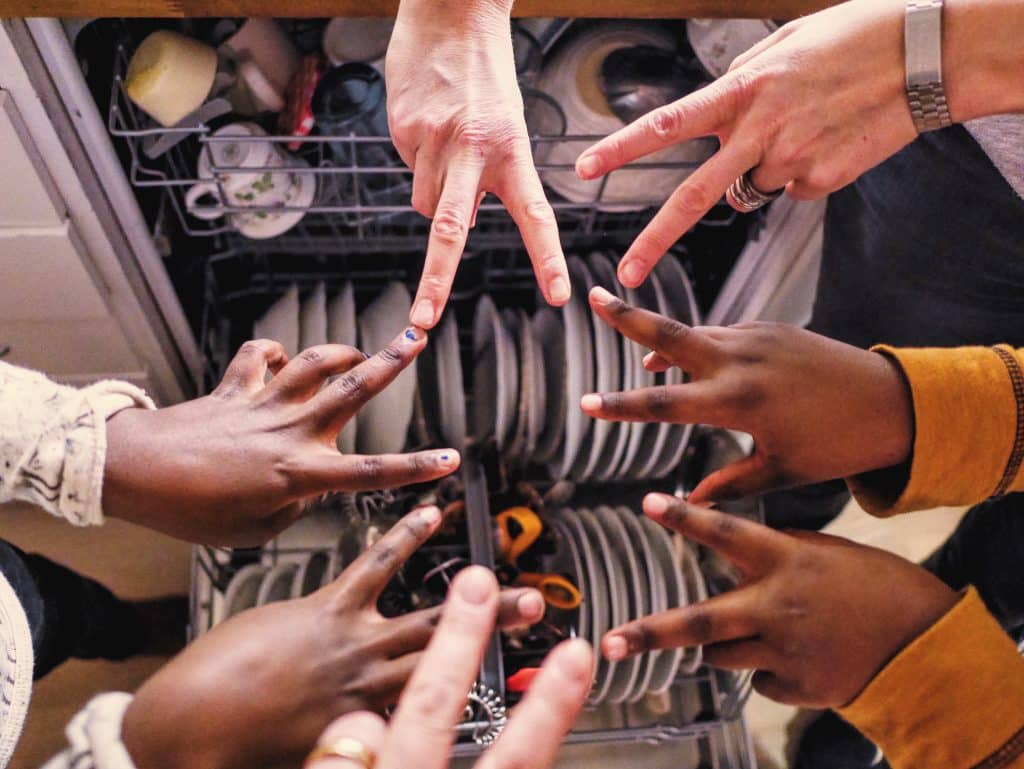 The kitchens of the future will not only be smart but also deeply collaborative. Thanks to the power of the Internet of Things (IoT), appliances will no longer function as isolated tools.
The kitchens of the future will not only be smart but also deeply collaborative. Thanks to the power of the Internet of Things (IoT), appliances will no longer function as isolated tools.
Instead, they will work together as a connected ecosystem driven by technology.Imagine your refrigerator communicating directly with your oven.
It could share information about the ingredients you have inside, their freshness, and even suggest the best meals you can prepare.
This eliminates guesswork and makes cooking more efficient.The oven, in turn, could automatically adjust its settings based on what the fridge reports.
From temperature to cooking time, everything could be optimized to deliver the perfect dish without you needing to intervene.
Other appliances, such as stoves, dishwashers, and even coffee makers, will also become part of this network. By sharing data and working in harmony, they will transform meal preparation into a seamless and stress-free process.
This integration technology will redefine what teamwork in the kitchen looks like. Instead of managing each device separately, you’ll have a collaborative environment where appliances anticipate your needs, save time, and improve results.
Sustainability FocusIn the future of smart kitchens, sustainability will remain a key priority.
As environmental awareness grows, households will increasingly look for ways to align their lifestyles with eco-friendly practices.
Here, technology plays a crucial role in reducing waste and conserving resources.New generations of smart appliances will come equipped with features designed to monitor carbon footprint and optimize energy efficiency.
Instead of running at full power all the time, devices will learn usage patterns and adjust their performance to save electricity without sacrificing results.
Dishwashers, for example, will be able to recycle and filter water for multiple cycles, dramatically lowering water consumption.
Smart refrigerators will integrate freshness-extending technology that regulates temperature and humidity, keeping fruits, vegetables, and dairy products fresh for longer and cutting down on food waste.
Beyond the environmental benefits, this shift also offers financial advantages.
By consuming fewer resources, households can significantly lower utility bills while still enjoying the comfort of modern living. It’s proof that technology and sustainability can work hand in hand to improve both the planet and our daily lives.
Ultimately, the focus on sustainability ensures that smart kitchens will not only make life easier but also contribute to a healthier, greener future.Is It Worth Investing in a Smart Kitchen?For many homeowners, the idea of a smart kitchen may seem like a luxury.
However, when we look closely at the benefits that technology brings, the investment quickly proves its value.
If you are seeking more convenience, time savings, and safety at home, the answer is a clear yes.Although smart appliances may still come with a higher price tag, costs are gradually becoming more accessible as technology advances and adoption grows.
In addition, the return on investment is not only financial but also emotional and practical.
By reducing food waste, saving energy, and preventing accidents, these appliances contribute to lower monthly expenses, greater sustainability, and peace of mind.Another important factor is flexibility
A smart kitchen is not just for high-end homes—you can start small with a smart coffee maker, an air fryer, or connected lighting, and gradually expand to larger systems such as smart refrigerators and automated ovens.
This modular approach allows you to adapt the technology to your budget while still enjoying its everyday benefits.
In the long run, investing in a smart kitchen means improving quality of life, increasing comfort, and preparing your home for the future.
Far from being just a passing trend, smart kitchens already represent the next step in modern living, where technology and design work together to make daily routines more efficient, enjoyable, and sustainable.
Final Thought:
The rise of the smart kitchen is more than just a home design trend—it represents the natural evolution of how we live and interact with our spaces.
By combining technology, convenience, and sustainability, smart kitchens not only simplify daily routines but also create safer and more enjoyable environments for families.





